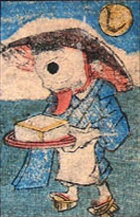Hyakkai-Zukan (百怪図巻, "The Illustrated Volume of a Hundred Demons") is a picture scroll by Edo period Japanese artist Sawaki Suushi. Completed in 1737...
3 KB (214 words) - 09:56, 3 May 2024
Yagyō by Sekien Toriyama, the Hyakkai Zukan by Sawaki Suushi, and the Bakemonozukushi by an unknown author. In the Hyakkai Zukan and Bakemonozukushi among...
4 KB (444 words) - 14:07, 18 March 2024
emaki, such as the Hyakkai Zukan by Sawaki Suushi and the Gazu Hyakki Yagyō by Toriyama Sekien (1776). In the Edo Period Hyakkai Zukan (1737, Sawaki Suushi)...
11 KB (1,558 words) - 08:31, 20 November 2023
appears in Edo Period yōkai emaki such as the Gazu Hyakki Yagyō and the Hyakkai Zukan. It is depicted with indistinguishable wrinkles on its face and body...
11 KB (1,447 words) - 17:25, 20 September 2024
were published (yōkai emaki), with nekomata frequently depicted. The Hyakkai Zukan published in 1737 (Gembun 2) includes an illustration of a nekomata...
15 KB (1,967 words) - 04:43, 21 December 2024
Yuki-onna (ゆき女) from the Hyakkai-Zukan by Sawaki Suushi...
27 KB (4,039 words) - 19:01, 23 December 2024
Nuribotoke (塗仏) is a yōkai found in Japanese yōkai emaki such as the Hyakkai Zukan by Sawaki Suushi. They are also depicted in the Gazu Hyakki Yagyō by...
9 KB (1,180 words) - 17:28, 20 September 2024
Japanese emaki such as the Hyakkai Zukan by Sawaki Suushi and the Gazu Hyakki Yagyō (1776) by Sekien Toriyama. In the Hyakkai Zukan (1737, Sawaki Suushi),...
7 KB (970 words) - 15:47, 4 August 2024
changed form of sea snakes. Many Edo Period publications such as the Hyakkai Zukan, Gazu Hyakki Yagyō, among others, depict this yōkai as a woman with...
7 KB (1,111 words) - 15:04, 13 September 2024
emaki such as, the Hyakkai Zukan and the Gazu Hyakki Yagyō. They can also be written しゃうけら, せうけら, as well as 精螻蛄. In the Hyakkai Zukan, Gazu Hyakki Yagyō...
4 KB (599 words) - 07:02, 14 July 2024
penghou that lives in trees. In collections of yōkai depictions like the Hyakkai Zukan and the Gazu Hyakki Yagyō, the yamabiko that looks like a dog is thought...
5 KB (631 words) - 14:02, 8 October 2024
grater Zenfushō - A possessed teakettle Zorigami – A possessed clock Hyakkai Zukan List of legendary creatures from Japan Komatsu Kazuhiko, in the book...
18 KB (2,275 words) - 17:41, 5 November 2024
is one by the name of "nurarihyon," and it is also depicted in the Hyakkai Zukan (1737, Sawaki Suushi) and the Hyakki Yagyō Emaki (1832, Oda Gōchō, in...
14 KB (1,949 words) - 17:28, 20 September 2024
(ushi-oni waterfall). In yōkai emaki of the Edo Period such as the Hyakkai Zukan, they are most often shown with the bovine head and a spider torso....
35 KB (5,240 words) - 08:05, 3 November 2024
a yōkai with head and body hair made of layers of this "o". In the Hyakkai Zukan (1737, Sawaki Suushi), a yōkai emaki from the Edo period, it is given...
5 KB (579 words) - 09:57, 5 July 2023
(うわん) is a Japanese yōkai depicted in Edo Period pictures such as the Hyakkai Zukan by Sawaki Suushi and the Gazu Hyakki Yagyō by Sekien Toriyama. They...
5 KB (586 words) - 14:42, 3 May 2024
"Yamauba" (山うば) from the Hyakkai Zukan by Sawaki Suushi...
10 KB (1,363 words) - 20:13, 6 June 2024
originally be from Satō Arifumi's writing, Ichiban Kuwashii Nihon Yōkai Zukan (いちばんくわしい日本妖怪図鑑). According to this book, upon encountering with someone...
9 KB (1,190 words) - 03:21, 28 October 2024
based on the yamabiko found in the Konjaku Gazu Zoku Hyakki and the Hyakkai Zukan and other collections, but according to the folklorist Kunio Yanagita...
5 KB (640 words) - 14:20, 27 October 2024
Occasionally, yume no seirei appears in this procession. He appears in the Hyakkai Zukan, "The Illustrated Volume of a Hundred Demons," created by Sawaki Suushi...
5 KB (603 words) - 18:29, 20 September 2024
A nure-onna as depicted in Sawaki Suushi's Hyakkai-Zukan...
46 KB (5,966 words) - 20:46, 2 January 2025
"Inugami" from the Hyakkai Zukan by Sawaki Suushi...
18 KB (2,389 words) - 23:09, 20 September 2024
Katsushika Hokusai Kidōmaru by Utagawa Kuniyoshi Nekomata from the Hyakkai Zukan by Sawaki Suushi Tsuchigumo from the Shinkei Sanjurokkai Sen (新形三十六怪撰)...
42 KB (4,692 words) - 06:12, 27 December 2024
Hitokuchizaka came from. In yōkai depictions from the Edo period such as the Hyakkai Zukan, the "Bakemono Zukushi", and the "Bakemono Emaki", it was depicted under...
13 KB (1,880 words) - 08:25, 23 September 2023
will never be blessed with good fortune. In the Edo Period yōkai emaki Hyakkai Zukan (Sawaki Suushi, 1737), the Bakemonozukushi (author and year unknown...
9 KB (1,235 words) - 16:34, 26 July 2024
Gazu Hyakki Yagyō heavily references a 1737 scroll-painting called the Hyakkai Zukan by artist Sawaki Sūshi; Sekien's innovation was preparing the illustrations...
9 KB (815 words) - 18:25, 21 December 2023
simply an illness that results in hair falling off. Starting with the Hyakkai Zukan the emakimono drawn in the Edo Period depict the "kamikiri" as a yōkai...
11 KB (1,628 words) - 01:39, 8 September 2024
Yūrei (Japanese ghost) from the Hyakkai Zukan, c. 1737...
113 KB (12,806 words) - 00:09, 2 January 2025
having various appearances in yōkai depictions. In the yōkai emaki, the "Hyakkai Zukan" from the Edo period (refer to image) as well as the yōkai sugoroku...
15 KB (1,917 words) - 17:19, 20 September 2024


























